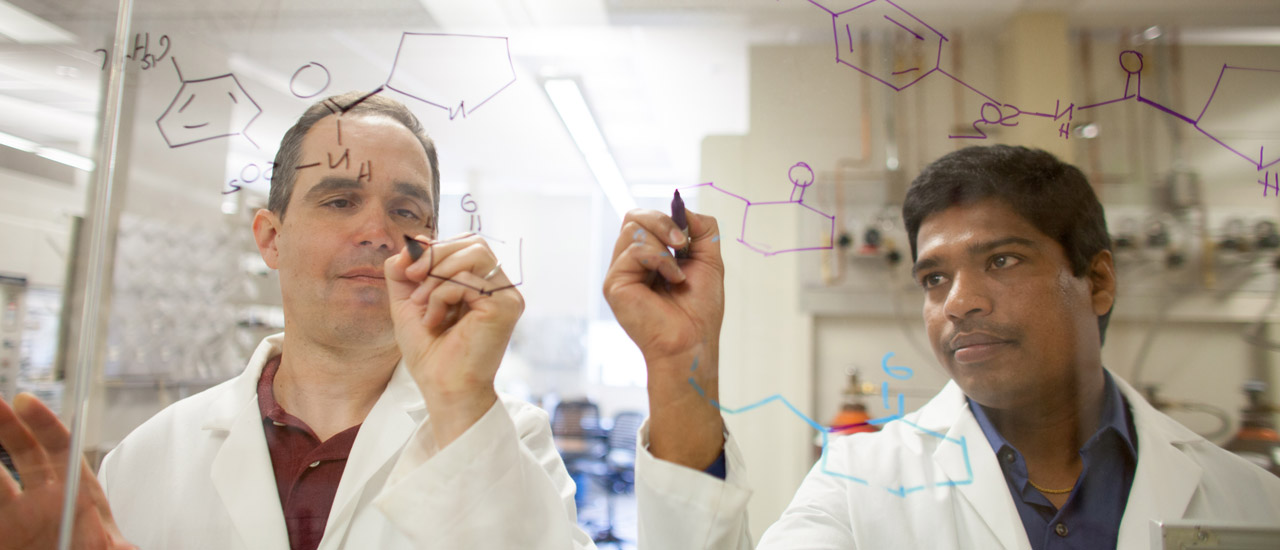Learn more about online chemistry classes
The OSU Chemistry Department also offers additional online chemistry courses through Ecampus. Choose a course to get more info on topics covered and scheduling.
CH 130 - General Chemistry of Living Systems (4). This one-term survey course provides an introduction to organic chemistry and the chemistry of biological systems. It fulfills requirements for many majors in the health professions, but does not count toward a chemistry major or minor. All components of the course, including the lab experience, are completed online. Course covers: acids and bases; alkanes; alkenes; alkynes; aromatic compounds; alcohols and ethers; amines and amides; aldehydes and ketones; carboxylic acids and esters; carbohydrates; lipids; amino acids and proteins; enzymes; biochemical energy; nucleic acids and protein synthesis.
NEW - SEMESTER CLASS!
CH 140 - General, Organic and Biological Chemistry (6). Students that require only “one semester of Chemistry with labs” should consider taking this class. This 6 quarter-credit class follows OSU’s quarter schedule (10 weeks plus finals), and could transfer to a semester school as 4 semester credits.* Examples of majors requiring one semester of chemistry include: Dental Hygiene, Dietetics, Exercise Science and some Nursing programs. This class gives students a foundation in general chemistry, as well as introducing important topics related to the chemistry of living systems. The lab component is included within the course and can be completed fully online. Topics include measurement, energy and matter, nuclear chemistry, bonding, gases, solutions, rates and equilibrium, acids and bases, organic compounds and reactions, carbohydrates, lipids, proteins, enzymes, nucleic acids and protein synthesis, and metabolism.
* Check with your institution on transfer credits.
CH 374 - Technology, Energy, and Risk (3). Decision-making in a technical, democratic society. Discussion of current issues such as acid rain, toxic organic chemicals in the environment and energy resources, etc.
CH 390 - Environmental Chemistry (3). Sources, reactions, transport, effects, and fates of chemical species in water, soil, air, and living environments and the effects of technology thereon.
CH 490/590 - Computer Programming for Scientists (3). Programming, numerical and graphical analysis, problem solving, simulations and use of databases for information handling and retrieval. Applications to problems in chemistry.
NEW - Fall 2014!
CH 582 - Chemistry and Materials in Batteries and Supercapacitors (3). This course focuses on the chemistry and materials currently in use and proposed for primary and secondary batteries and supercapacitors. After a brief historical review, students will examine state-of-the-art technologies including lithium-ion, lithium, and soldium-sulfur batteries and electrochemical double-layer capacitors, and future technologies such as metal-air and lithium sulfur. Class discussions will focus on structure/performance relationships and other issues such as environmental impact, safety and cost.
NEW!
CH 584 - Instruments and Online Interactions in the Physical Sciences (3). This new fully online course is designed for middle school, high school and college-level science instructors, as well as graduate students in STEM education. CH 584 provides professional development and continuing education credits for science teachers in the integration of different technologies for distance delivery of laboratory instruction in science classes. The course focuses on virtual lab delivery, but participants will also evaluate the strengths and limitations of different methods and technologies, such as lab packs and remote instrument access. At class completion, students will have created a portfolio of instructional lab content that can be used in their practice.
View the YouTube video discussing all the online chemistry courses to learn more about which chemistry sequence is right for you.
Want more info?
Let us know and we’ll send you the details you need.
Request info
Book an appointment
Important dates
See our academic calendar for our full quarter term schedule.
Program quick facts
* Oregon State University is on a quarter-term system. There are four quarters each year and classes are 11 weeks long.
† Cost per credit is calculated using tuition per credit for the current academic year. It does not include associated fees, course materials, textbook expenses, and other expenses related to courses. Courses numbered 5XX and higher are graduate level tuition.
‡ Course sequences can include classes that are delivered online, as well as a blend of online coursework with one or a few required site-based classes.
Find application deadline
View required or recommended deadlines for your student type on our application deadlines page.
Ready to apply?
Once you've gathered the information you need to know before you apply to Oregon State University, take the next steps.


